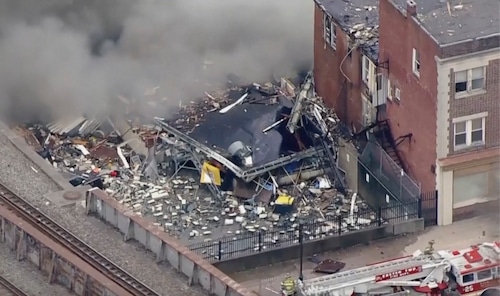By the Associated Press’s Michael Rubinkam
A federal safety board said Tuesday that a 2023 strong explosion at a chocolate factory in Pennsylvania killed seven workers when the firm neglected to evacuate due to a series of errors involving a rusted steam line and a malfunctioning natural gas fitting.
At the time of the explosion, R.M. Palmer Co. employed about 70 production workers and 35 office staff in two nearby buildings. Before the explosion, workers in both buildings reported smelling gas to federal investigators. The factory, which is located in a small town 60 miles (96 kilometers) northwest of Philadelphia, should have been evacuated, according to workers who have accused the firm of ignoring warnings of a natural gas leak.
The firm did not have natural gas emergency protocols in place, which might have led to an immediate evacuation, according to the National Transportation Safety Board. In addition to blasting flames more than 40 feet (21 meters) into the air and generating $42 million in property damage, the explosion completely destroyed one building and seriously injured another.
The National Transportation Safety Board stated in its statement of probable cause, which was approved Tuesday at the board’s meeting in Washington, D.C., that the R.M. Palmer Company’s inadequate emergency response protocols and employee training contributed to the accident’s severity because the employees failed to recognize the hazard and evacuate the buildings prior to the explosion.
Although Palmer has subsequently implemented an updated evacuation policy, NTSB board chair Jennifer Homendy stated that it is still inadequate since it instructs workers to conduct their own research and decide whether evacuation is required.
In this case, she claimed, that’s precisely what they did. No, you go. They now respond that because chocolate is being made in their building, there are other scents. You are aware of the distinction between chocolate and the fragrance of natural gas. Leave now. Therefore, I believe that this is causing a great deal of confusion for their staff, and it should be changed.
Officials at Palmer were contacted for comment.
The role of UGI Corp., the gas utility that supplied service to the West Reading candy business, was also explained by the federal safety agency.
Federal safety investigators discovered that an old, severely corroded Palmer steam pipe finally cracked, letting steam escape and increasing the temperature of UGI’s gas fitting to the point where it cracked as well. After that, the gas moved underground and entered Palmer’s second building’s basement, where it exploded. Investigators were unable to identify the source of ignition.
The five-member safety board discovered that a UGI crew that was replacing gas lines in the area in 2021, two years prior to the explosion, was aware of the steam pipe’s existence but neglected to inform the utility’s safety managers so the pipe could be evaluated for its influence on the gas fitting that eventually failed.
According to the safety board’s findings, UGI Corporation’s distribution integrity management program failed to avoid the accident by failing to address the hazard posed by the steam pipe. The board also said that UGI failed to appropriately identify its valves and that a crucial valve had been paved over, which caused a delay in the gas shut-off following the explosion.
UGI stated that it is examining the results.
In the areas we serve, where we work, and where we live, safety continues to be our first priority. According to John Mason, a company representative, UGI is still working with clients who also run subterranean steam lines to ensure that their systems and our natural gas systems can coexist securely. According to him, the business has complied completely with NTSB.
DuPont, the manufacturer of the failed service tee, is known for its propensity to shatter. Although plastic piping is still widely used nationwide, the safety board stated that many utilities might not be aware of the areas where high temperatures are most likely to cause it to collapse.
Dane Spillers, an NTSB pipeline accident investigator, stated, “We don’t have a good idea how much is out there.”
J. Todd Inman, a board member, said the NTSB brought up many of the same concerns in the 1996 explosion at a shoe store in San Juan, Puerto Rico, which killed 33 people. He connected the Palmer accident to that incident. Much of the plastic pipe used for natural gas distribution between the 1960s and the early 1980s was prone to breaking, according to federal authorities for a long time.
He remarked, “There are times when you think we can learn our lesson, or at least the operators can.”
For UGI and other utilities, regulatory bodies, state governments, and R.M. Palmer itself, the NTSB released a number of suggestions. One suggestion is that companies, residences, educational institutions, and other structures that use natural gas should install leak-detection alarms.
More in Nation-World News
Note: Every piece of content is rigorously reviewed by our team of experienced writers and editors to ensure its accuracy. Our writers use credible sources and adhere to strict fact-checking protocols to verify all claims and data before publication. If an error is identified, we promptly correct it and strive for transparency in all updates, feel free to reach out to us via email. We appreciate your trust and support!

